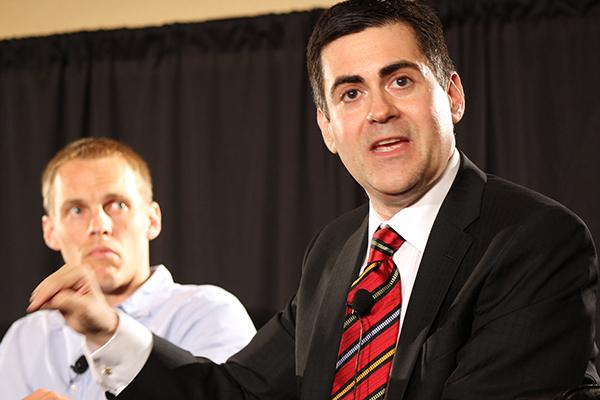In the wake of tragic shootings of unarmed black men at the hands of vigilantes and white police officers, many institutions across American society, from the president on down, have sought to foster “national conversations” about race.
Perhaps surprisingly, an agency of the Southern Baptist Convention is sponsoring one of the most important and fruitful such conversations. The SBC’s public policy arm, the Ethics & Religious Liberty Commission, has hosted a summit on racial reconciliation last week in Nashville, Tenn.
Founded in 1845 in a split over slavery, the SBC has made laudable efforts to overcome its racist past. Some moderate and liberal Southern Baptist leaders prophetically denounced racism and supported the civil rights movement, but those very leaders were forced out of the denomination during a period of conservative resurgence in the 1980s. Today’s SBC leaders are in the tenuous position of saying that moderates were right about race but wrong about everything else.
Southern Baptist leaders are determined to challenge the lingering indifferent or crude attitudes on race where they still exist among the denomination’s mostly white, mostly Southern constituency.
Charged with carrying out the SBC’s political priorities, the ERLC is best known for its advocacy for religious freedom and against abortion and same-sex marriage. Yet in the wake of unrest over last year’s deaths of Michael Brown in Ferguson, Mo., and Eric Garner in Staten Island, N.Y., the ERLC hastened its plans to hold a summit on race.
The Nashville event drew more than 500 clergy, lay leaders, and seminarians from across Southern Baptist life. Thousands more watched a live stream online. The speaker lineup was male-dominated but was decidedly mixed race. The ERLC was much more eager to hear from ethnic minorities at this summit than it was to hear from gay people at its fall conference on homosexuality.
While the sexuality conference projected certainty and unanimity — acceptance of homosexual expression is inconsistent with Christianity and will not be tolerated in Southern Baptist churches — white Baptists came to their race summit with genuine humility and a spirit of repentance for the harm racism has caused.
Dean Inserra, lead pastor of City Church in Tallahassee, Fla., challenged the audience: “When you say a school or neighborhood has ‘gone downhill,’ what are you saying?”
Conceding his own need for greater empathy, Inserra recalled asking a black clergy colleague to help him understand how police violence affects black communities.
White SBC leaders also shared stories of having to denounce racist attitudes that persisted in their churches. Danny Akin, president of Southeastern Baptist Theological Seminary, once rebuked a church for firing a pastor who had accepted a black family into membership.
Each in their own way, white conference speakers acknowledged past wrongs and expressed sincere desires to make it right. Black leaders gently shared experiences and suggestions for how pastors and churches can more effectively embody racial reconciliation.
Though I have been publicly critical of Southern Baptist elites and institutions, as I studied Southern Baptist life and got to know some of its leaders, I can unequivocally say: These men do not have a racist bone in their bodies.
That said, anyone hoping this summit will lead to concrete political support for a civil rights agenda will be disappointed.
The fact is that SBC culture is still dominated by white conservatives whose greatest fear is that a Christian might have to bake a wedding cake for a lesbian couple. The issue of voting rights never crossed the lips of any speaker in Nashville, and I doubt affirmative action even crossed their minds. In discussions of the #BlackLivesMatter slogan, several speakers asked variations of, “If black lives matter, why do their mothers abort so many of them?” There was little discussion of how to improve the lives of disadvantaged black children once they are born.
In fairness, the ERLC was more interested in facilitating racial awareness in local churches than in broadening its portfolio of political aims. In fact, there are young clergy of diverse racial backgrounds intentionally planting multiethnic churches across the country.
But it would be a powerful witness if, for instance, Southern Baptists passed a resolution against voter identification laws at their annual meeting this June. Ostensibly designed to combat the alleged problem of voter fraud, these laws disproportionately disenfranchise poor and minority citizens. White conservative politicians are their most ardent supporters, for obvious reasons.
Progressive evangelical organizations, Roman Catholic groups, and mainline Protestant and black denominations oppose voter suppression laws. It should be easy for Southern Baptists committed to racial reconciliation to join this ecumenical consensus.
For all their good intentions, conservative evangelicals could do more to emphasize issues that resonate deeply in minority communities. If their public posture remains primarily a catalog of concerns of aggrieved Southern whites, they shouldn’t be surprised if few black folks come along.
Jacob Lupfer is a contributing editor at Religion News Service and a doctoral candidate in political science at Georgetown University. His website is www.jacoblupfer.com. Follow him on Twitter at @jlupf. Via RNS.
Got something to say about what you're reading? We value your feedback!
